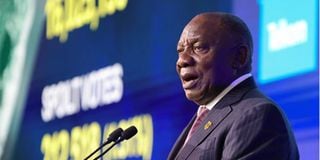Ramaphosa's government to co-operate with the opposition - a first in 30 years

South African President Cyril Ramaphosa speaks as people attend the announcement of the election results at the National Results Operation Centre of the IEC, which serves as an operational hub where results of the national election are displayed, in Midrand, South Africa June 2, 2024.
Cyril Ramaphosa was re-elected South Africa's president on Friday, June 14, having brokered a deal with the opposition for a government of national unity after his African National Congress party's worst election result since the end of apartheid.
A skilful negotiator, Ramaphosa clinched the agreement with the white-led Democratic Alliance and at least two other smaller parties as the National Assembly held its first sitting since the election and prepared to elect a head of state.
But Ramaphosa, 71, has emerged weakened from the May 29 election as the ANC lost its parliamentary majority, and some political analysts have questioned whether he will be able to serve a full second five-year term.
The ANC won just 40% of the vote, meaning Nelson Mandela's legacy liberation movement had to negotiate a power-sharing agreement with rival parties for the first time in 30 years.
As well as the DA, the ANC's partners in the coalition government include the socially conservative Inkatha Freedom Party and right-wing Patriotic Alliance.
Many questions remain about how they will divvy up key jobs and reconcile opposing policy positions.
An ANC member was elected parliament speaker, while a DA candidate was made deputy speaker. Ramaphosa is expected to have to cede cabinet positions to the DA, IFP and PA.
After the vote, former union leader-turned-businessman Ramaphosa - Mandela's lead negotiator in talks to end apartheid - received the backing of top ANC officials to stay on.
But his party is deeply divided, and some of Ramaphosa's party rivals may not have buried the hatchet for long.
TOUGH TEST
Ramaphosa's future as president has hung in the balance before. A panel report found in 2022 that he may have committed misconduct over a stash of cash stuffed into furniture at his game farm.
He denied wrongdoing over that scandal, dubbed "Farmgate", and won a new five-year term as ANC leader later that year.





